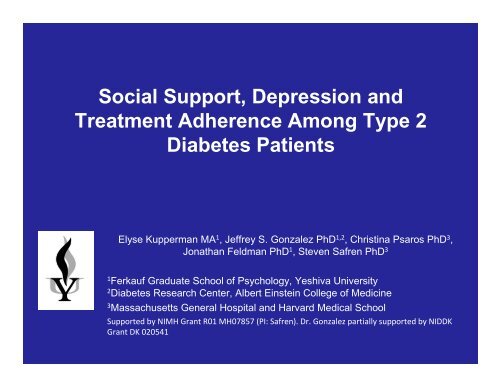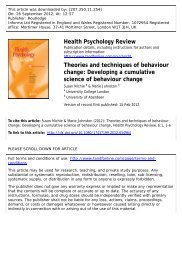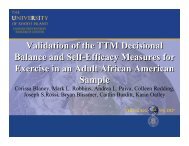Social Support, Depression and Treatment Adherence Among Type ...
Social Support, Depression and Treatment Adherence Among Type ...
Social Support, Depression and Treatment Adherence Among Type ...
Create successful ePaper yourself
Turn your PDF publications into a flip-book with our unique Google optimized e-Paper software.
<strong>Social</strong> <strong>Support</strong>, <strong>Depression</strong> <strong>and</strong><br />
<strong>Treatment</strong> <strong>Adherence</strong> <strong>Among</strong> <strong>Type</strong> 2<br />
Diabetes Patients<br />
Elyse Kupperman MA 1 , Jeffrey S. Gonzalez PhD 1,2 , Christina Psaros PhD 3 ,<br />
Jonathan Feldman PhD 1 , Steven Safren PhD 3<br />
1 Ferkauf Graduate School of Psychology, Yeshiva University<br />
2 Diabetes Research Center, Albert Einstein College of Medicine<br />
3 Massachusetts General Hospital <strong>and</strong> Harvard Medical School<br />
<strong>Support</strong>ed by NIMH Grant R01 MH07857 (PI: Safren). Dr. Gonzalez partially supported by NIDDK<br />
Grant DK 020541
Background<br />
• <strong>Treatment</strong> nonadherence is common:<br />
• ½ of adults with diabetes have HbA1c above 7.0%<br />
• Suboptimal rates of adherence<br />
Shaya et al., 2010<br />
• 65% to 85% among type 2 diabetes patients Rubin, 2005<br />
• Only 1/3 of patients are adherent > 90% of days over 1 year<br />
• Nonadherence has been associated with :<br />
• Hyperglycemia, hypertension, <strong>and</strong> dyslipidemia<br />
• Increased risk for hospitalization <strong>and</strong> mortality<br />
Donnan et al., 2002<br />
Ho et et al., 2006
Background<br />
• <strong>Social</strong> support is associated with better<br />
adherence<br />
DiMatteo,2004<br />
• <strong>Depression</strong> associated with poorer adherence<br />
Gonzalez et al., 2008<br />
• <strong>Support</strong> <strong>and</strong> depression are negatively<br />
related<br />
Cohen & Wills, 1985<br />
• Interaction predicting adherence has not been<br />
examined
Purpose<br />
• To examine:<br />
1) interrelationships among social support,<br />
depression, <strong>and</strong> diabetic medication<br />
adherence.<br />
2) evidence for a moderating role of depression<br />
in explaining the relationship between social<br />
support <strong>and</strong> diabetic medication adherence.
Methods<br />
• Participants<br />
– Massachusetts General Hospital <strong>and</strong> affiliated<br />
primary care practices throughout Boston,<br />
MA.<br />
• Inclusion Criteria:<br />
– <strong>Type</strong> 2 Diabetes<br />
– Between the ages of 18 <strong>and</strong> 70<br />
– Taking oral medication or insulin to treat<br />
diabetes<br />
• Exclusion Criteria:<br />
– Cognitive condition<br />
• e.g., psychosis, mental retardation, dementia
Measures<br />
• Questionnaires:<br />
• <strong>Social</strong> <strong>Support</strong> Questionnaire-Short Form<br />
(SSQSR) (Sarason et al., 1987).<br />
• Number of social supports <strong>and</strong> perceived satisfaction with social<br />
support<br />
• <strong>Depression</strong> Symptom Severity. The<br />
Montgomery-Asberg <strong>Depression</strong> Rating<br />
Scale (MADRS) (Montgomery & Asberg, 1979)<br />
• Medication <strong>Adherence</strong>: Diabetes Self-<br />
Care Behaviors: The Summary of<br />
Diabetes Self-Care Activities (SDSCA)<br />
(Toobert et al., 2000).
Demographics<br />
Characteristic<br />
N 147<br />
Age, mean (SD) 56 (9.3)<br />
Male 57%<br />
White 79%<br />
Married 56%<br />
Education (years) 14.49 (3.4)<br />
HbA1c 8.3(1.6)<br />
# of Diabetes Related<br />
Complications<br />
Prescribed Insulin<br />
Therapy<br />
# of Medications<br />
Prescribed<br />
0.5 (0.5)<br />
50%<br />
7.7 (3.8)
Means <strong>and</strong> st<strong>and</strong>ard deviations of the depression,<br />
social support, <strong>and</strong> medication adherence.<br />
Variable Mean SD<br />
___________________________________________________________<br />
<strong>Depression</strong> 21.4 9.9<br />
# of<br />
<strong>Support</strong>s 3.02 2.16<br />
<strong>Support</strong> Sat 4.33 1.33<br />
Medication<br />
<strong>Adherence</strong> 6.10 1.6<br />
____________________________________________________________
Quantitative Analyses<br />
<strong>Depression</strong> (r)<br />
p value<br />
Number of<br />
<strong>Support</strong>s<br />
-.17 .058<br />
<strong>Support</strong><br />
Satisfaction<br />
-.14 .09
Moderating role of depression in the relationship<br />
between number of social supports <strong>and</strong> medication<br />
adherence<br />
_____________________________________________________________________<br />
N = 129<br />
_____________________________________________________________________<br />
Variable R R2 R2 F <br />
p<br />
_____________________________________________________________________<br />
1. # of <strong>Support</strong>s .058 .003 .003 .43 -.058 .51<br />
2. <strong>Depression</strong>, .19 .035 .03 4.1 -.18 .045<br />
# of <strong>Support</strong>s -.09<br />
.32<br />
3. <strong>Depression</strong> x<br />
# of <strong>Support</strong>s .24 .056 .02 2.9 -.15 .09<br />
___________________________________________________________________
Moderating role of depression in the relationship<br />
between perceived social support <strong>and</strong> medication<br />
adherence<br />
_____________________________________________________________________<br />
N = 146<br />
_____________________________________________________________________<br />
Variable R R2 R2 F <br />
p<br />
_____________________________________________________________________<br />
1. <strong>Support</strong> Sat .02 .000 .000 .04 .016 .85<br />
2. <strong>Depression</strong>, .16 .03 .03 3.7 -.16 .056<br />
<strong>Support</strong> Sat -.006 .938<br />
3. <strong>Depression</strong> x<br />
<strong>Support</strong> Sat .25 .06 .04 5.6 -.195 .02*<br />
_____________________________________________________________________<br />
*p < .05
Post-hoc Probing Analysis
Post-hoc Probing Analysis
Conclusions<br />
• Significant interaction between depression <strong>and</strong><br />
social support in relation to adherence<br />
– No evidence of a synergistic effect<br />
– <strong>Depression</strong> was not related to adherence at low levels of support<br />
– <strong>Depression</strong> effect was most pronounced at high levels of support<br />
• Addressing depression at low levels of social<br />
support may have little effect on adherence<br />
• Need to consider the interplay between support<br />
<strong>and</strong> depression in adherence intervention<br />
research <strong>and</strong> clinical care
Questions
References<br />
• Cohen, S., & Wills, T. A. (1985). Stress, social support, <strong>and</strong> the buffering hypothesis.<br />
Psychological Bulletin, 98, 310-357.<br />
• DiMatteo, M. R. (2004). <strong>Social</strong> support <strong>and</strong> patient adherence to medical treatment: A metaanalysis.<br />
Health Psychology : Official Journal of the Division of Health Psychology, American<br />
Psychological Association, 23(2), 207-218.<br />
• Donnan, P.T., Macdonald, T.M., & Morrist, A.D. (2002). <strong>Adherence</strong> to prescribed oral<br />
hypoglycaemic medication in a population of patients with <strong>Type</strong> 2 diabetes: a retrospective<br />
cohort study. Diabetic Medicine, 19, 279-284.<br />
• Gallant, M. P. (2003). The influence of social support on chronic illness self-management: A<br />
review <strong>and</strong> directions for research. Health Education & Behavior : The Official Publication of<br />
the Society for Public Health Education, 30, 170-195.<br />
• Gonzalez, J. S., Peyrot, M., McCarl, L. A., Collins, E. M., Serpa, L., Mimiaga, M. J., & Safren, S.<br />
A. (2008). <strong>Depression</strong> <strong>and</strong> diabetes treatment nonadherence: A meta-analysis. Diabetes<br />
Care, 31(12), 2398-2403.<br />
• Ho, P.M., Rumsfeld, J.S., Frederick, A.M., McClure, D.L., Plomondon, M.E., Steiner, J.F., &<br />
Magid, D.J. (2006). Effect of medication nonadherence on hiospitalization <strong>and</strong> mortality<br />
among patients with diabetes mellitus, Arch Intern Med, 166, 1836-1841.<br />
• Levy, R. L. (1983). <strong>Social</strong> support <strong>and</strong> compliance: A selective review <strong>and</strong> critique of<br />
treatment integrity <strong>and</strong> outcome measurement. <strong>Social</strong> Science & Medicine (1982), 17, 1329-<br />
1338.<br />
• Rubin, R. R. (2005). <strong>Adherence</strong> to pharmacologic therapy in patients with type 2 diabetes<br />
mellitus. The American Journal of Medicine, 118 Suppl 5A, 27S-34S.<br />
• Shaya, F. T., Yan, X., Lin, P. J., Simoni-Wastila, L., Bron, M., Baran, R., & Donner, T. W. (2010).<br />
US trends in glycemic control, treatment, <strong>and</strong> comorbidity burden in patients with diabetes.<br />
Journal of Clinical Hypertension (Greenwich, Conn.), 12, 826-832.<br />
• van Dam, H. A., van, d. H., Knoops, L., Ryckman, R. M., Crebolder, H. F. J. M., & van, d. B.<br />
(2005). <strong>Social</strong> support in diabetes: A systematic review of controlled intervention studies.<br />
Patient Education <strong>and</strong> Counseling, 59, 1-12.

















